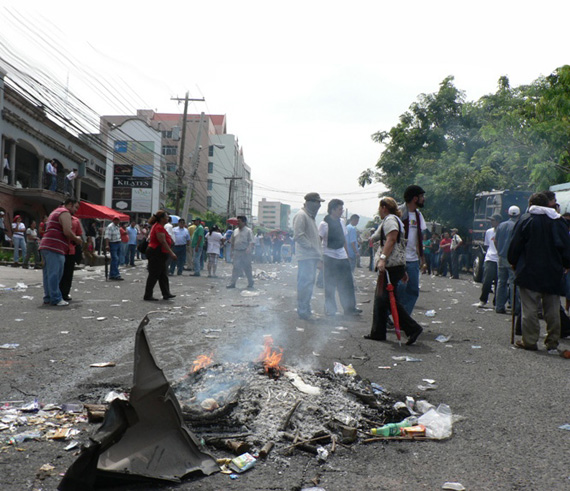|
Hondurans continue mobilizing across the country despite the
48 hour curfew imposed by de facto president Roberto
Micheletti.
The United Nations (UN), the Organization
of American States (OAS), the Central American
Congress, the European Union and several
countries around the world, including the government of the
United States, have condemned the coup and
have recognized José Manuel Zelaya as the only
legitimate President of Honduras.
Honduras’
labor and social organizations are mobilizing in
protest, defending their right to voice their opinion on
issues that affect the country, and demanding that President
Zelaya be allowed to return and that democracy be
restored.
As reported yesterday, the public sector has declared a
national strike, launched by the teachers’ union. Meanwhile,
roadblocks are being set up in different parts of the
country.
“The people are showing their strength despite the strategy
of the perpetrators of the coup, who are trying to terrorize
the population,” one of the leaders of the newly formed
Popular Resistance Front told
Sirel. The activist asked not to be identified because he
fears for his safety.
Education and other public sector activities are paralyzed,
while in different areas of the country, like Olancho, Santa
Bárbara and the north, protesters are blocking the access to
in major highways.
People have also joined the call for a Popular Referendum
and they are prepared to continue protesting until President
Zelaya is back in the country”, the activist
concluded.
Sadly, this movement of resistance -which continues to grow
in spite of the media ban and the strategy of terror
deployed by the coup perpetrators- has suffered its first
victim. Ulises Aguilar, a member of the
Telecommunications Union (SITRATEL) of the state
telephone company HONDUTEL, was brutally run over by
an army truck as he tried to prevent the soldiers from going
into company grounds.
According to several people who witnessed the incident, the
army was transporting workers from private companies to
replace the workers at HONDUTEL, with the aim of
taking control over the strategic telephone services.
On the morning of Monday, June 29, protesters gathered again
in front of the Presidential Residence and tension mounted
as specials forces of the National Police and the Army
advanced menacingly towards the gates.
Minutes later, protesters were savagely repressed. Several
demonstrators were hurt and many arrested. The police tried
to seize labor and social leaders, among them Carlos Reyes.
Later that night, rumors pointing to the death of
César Ham,
a
popular movement leader and Democratic Union (UD)
congressman, and the disappearance of Carlos Reyes,
STIBYS general secretary and independent presidential
candidate, were denied. The rumors were most likely part of
the strategy of the coup perpetrators to spread fear and
doubts among the population. Both have gone underground, but
are working actively to contribute to organize the
resistance to the coup.
Possible scenarios
There are two elements in the difficult situation in
Honduras that are key for the reinstatement of the
democratic order in the country.
First, the international community must take a firm stand
against the coup, and it has in fact already voiced its
unanimous condemnation. Such stand must include the refusal
to recognize the de facto president appointed by Congress.
Secondly, it is essential that social movements and the
population in general continue their mobilization. In that
sense, “the contribution of the labor movement in this
process is crucial, even though we must acknowledge that the
most important decisions are being made by the group of
organizations as a whole,” Carlos Reyes declared by
telephone from his underground location.
“We hope to be able to continue with the strike in the
public sector and with the roadblocks in some highways in
other parts of the country, to paralyze activities in other
areas,” Reyes said.
“I would also like to highlight the importance of the IUF’s
presence,” Reyes continued, “as it is the only
international labor organization that has come to support us
and report the country’s situation to the rest of the world.
We thank the IUF for its solidarity, as well as the
entire team at the Latin American Regional Office, who are
also carrying out significant efforts to denounce the
situation in Europe”.
 |